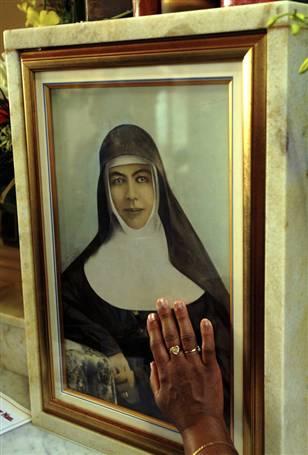MSNBC
October 17, 2010
http://www.msnbc.msn.com/id/39707849/ns/world_news-asiapacific/
 |
| A pilgrim touches a portrait of Mary MacKillop beside her tomb at Mary Mackillop Place in Sydney, Australia, Sunday, Oct. 17, 2010. |
SYDNEY — Pope Benedict on Sunday gave Australia its first saint, a 19th century "whistleblower" nun who activists say should be the patron of victims of sexual abuse by priests because she was punished for exposing it.
At a solemn ceremony in St Peter's Square, the pope canonized Mother Mary MacKillop as well as five other church figures from Poland, Canada, Spain, and Italy who lived in the 15th to 20th centuries.
Tens of thousands of Australian pilgrims traveled to Rome to attend the mass where the pope read a sainthood decree for MacKillop, one of the few saints in Church history who were excommunicated and later rehabilitated.
Chants of "Aussie Aussie Aussie, Oi Oi Oi" echoed throughout St. Peter's Square as a raucous crowd of flag-and-balloon-bearing Australians cheered their native Mary MacKillop. In Sydney, huge images of the nun were projected onto the sandstone pylons of the iconic Sydney Harbor Bridge.
Speaking in Latin on the steps of St. Peter's Basilica, Benedict read out the names of each of the six new saints, declaring each one worthy of veneration in all the Catholic Church. Also among them was Brother Andre Bessette, a Canadian brother known as a "miracle worker" and revered by millions of Canadians and Americans for healing thousands of sick who came to him.
"Let us be drawn by these shining examples, let us be guided by their teachings," Benedict said in his homily, delivered in English, French, Italian, Polish and Spanish to reflect the languages spoken by the church's newest saints.
A cheer had broken out in the crowd when MacKillop's name was announced earlier in the Mass, evidence of the significant turnout of Australians celebrating the humble nun who was briefly excommunicated in part because her religious order exposed a pedophile priest.
Excommunication
A maverick and feisty upstart in the spirit of her young nation, MacKillop, the daughter of Scottish immigrants, founded the Sisters of St Joseph of the Sacred Heart in 1867 to help the poor and educate their children.
Independent-minded, she regularly clashed with the church's male hierarchy and the tensions led to her excommunication — the Catholic Church's harshest penalty, which denies the sacraments to a person — in 1871. The order was later lifted.
Documents recently uncovered in Australia showed that MacKillop was banished from the Church in part because her order uncovered a case of sexual abuse of a boy by an Irish priest.
In his homily at the mass, the pope did not mention any of MacKillop's travails with the male Church hierarchy but spoke of her "saintly example of zeal, perseverance and prayer" and the many challenges she faced.
In the wake of the new documents, some activists in the Church have called on the Vatican to declare her the patron saint of those who suffered sexual abuse by priests.
Priests were "annoyed that somebody had uncovered it ... and being so angry, the destruction of the Josephites was decided on," said Rev. Paul Gardiner, the chaplain of the Mary MacKillop Penola Center, a state-run historic site.
The exposure of the priest was just one of many factors — including bitter rivalries among priests — that led to her excommunication, the Sisters of St. Joseph said in a statement.
She and 47 other nuns were thrown onto the streets of Adelaide, relying on the charity of friends to survive.
Five months later, the bishop revoked his ruling from his deathbed, restoring MacKillop to her order and paving the way for her decades of work educating the poor across Australia and New Zealand.
19th century costume
"It is a great day," Sister Monica Cavanagh, acting secretary general of MacKillop's order, told Reuters."We are proud of Mary. We are proud that she's Australian, that she's a woman and she's a Josephite. We are just filled with great joy. We have probably even had a few tears today," Cavanagh said from MacKillop's tomb, a short distance from Sydney's famous harbor.
In the town of Penola in South Australia state, where in 1866 MacKillop founded the Sisters of Saint Joseph of the Sacred Heart, a special mass was celebrated with children dressing up in 19th century costume.
In Melbourne where she was born, Australia's atheist Prime Minister Julia Gillard joined celebrations commemorating her life. Near MacKillop's tomb in Sydney, giant screens were set up to broadcast the canonization ceremony live.
Foreign Minister Kevin Rudd, a Catholic who has traveled to Rome for the event, commended MacKillop for "extending education services to girls, to the poor, to the far flung parts of Australia." Opposition leader Tony Abbott, also a Catholic, called MacKillop "inspirational."
Around 5 million of Australia's 22 million people are Catholic, making it the country's largest religion.
Born in Melbourne in 1842 to Scottish parents, MacKillop's worked to provide Catholic education at a time when many poor children in colonial Australia received no education at all.
The Catholic Church has credited MacKillop for interceding with God in what the Church considers two miracle cures, the latest that of Kathleen Evans, who was cured of lung and brain cancer in 1993 after praying to MacKillop.
Another Australian woman, Veronica Hopson, 72, was inexplicably cured of leukemia in 1961 after praying to MacKillop.
A special cross made from timber taken from MacKillop's original school has toured Australia over the past two months in preparation for her canonization.
Today's Josephites work in several countries, including Australia's neighbor East Timor. They no longer wear the traditional nun's habit, but wore a blue scarf on Sunday to denote membership of the order.
Any original material on these pages is copyright © BishopAccountability.org 2004. Reproduce freely with attribution.